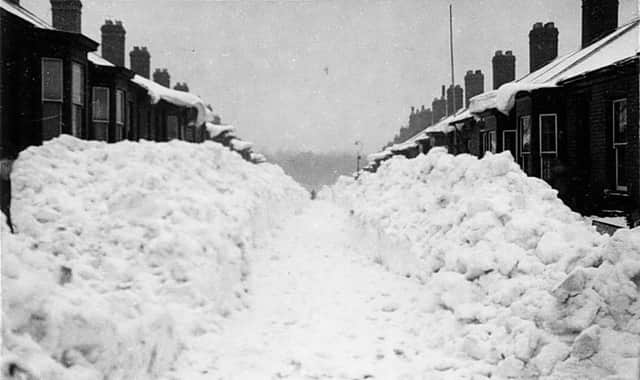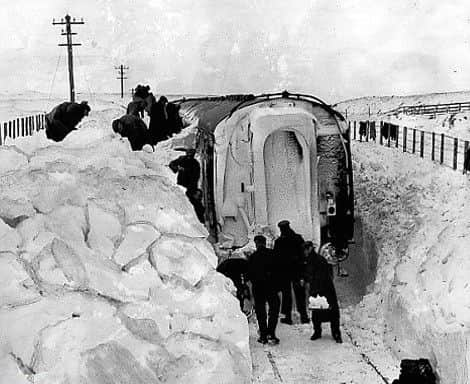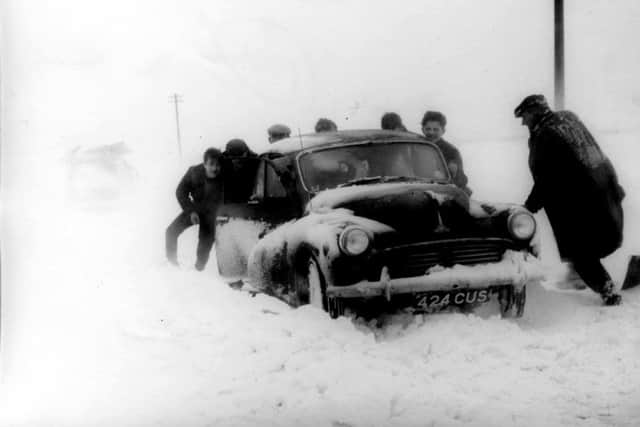The Sunderland winter which froze the anti-freeze in cars!


Think again. Just over 50 years ago, Sunderland was hit by Arctic conditions which saw snow on the ground for 67 days.
Philip Curtis, from the Sunderland Antiquarian Society, explains more.


Advertisement
Hide AdAdvertisement
Hide AdWho remembers the winter when 13in of snow fell on Sunderland in a fortnight?
It happened in 1963.
It all started on Wednesday, January 2, when a three-day blizzard hit the city. By the end of that week, Wearside was well and truly in the grip of ice and snow. It would not ease for weeks.
Snowfalls over the next few days were in the form of freezing blizzards which raged for hours at a time.


By January 9, bitterly cold gales up to 70mph whipped the snow into giant drifts, many up to 15ft high in places.
Advertisement
Hide AdAdvertisement
Hide AdA pattern developed of arctic nights being followed by daily snowfall.
And when they came, they lasted for hours at a time.
Sunderland had 12 snowploughs and eight gritting machines, and they were all working flat out to clear bus routes.


By January 12, the labour force had rocketed to 300, and every one of them was called out that night at 1am to clear the local roads.
Incredibly, as soon as they had done their job, they were finding 3in of snow on the roads they had just cleared.
Advertisement
Hide AdAdvertisement
Hide AdIn the first two weeks of that January, 13in of snow fell on Sunderland.
Many areas of the city were regularly cut off because of the blocked roads and gridlocked traffic.


Appeals went out to all motorists in difficulty to help themselves to the contents of the city’s 50 grit boxes, so the snowploughs would not have to make unnecessary journeys.
Wearsiders were asked to clear their own footpaths. Authorities did not want snow piled into heaps in case drains became blocked.
Advertisement
Hide AdAdvertisement
Hide AdSchools were hit by a measles epidemic, with 200 cases reported in the first two weeks of the year. Cases of pneumonia went up.
The problems got worse on January 15. The weather warmed up and water pipes burst.
And then the blizzards came back the next day to freeze everything up again.
People were warned against trying to light boilers if the hot water system wasn’t working. It could cause an explosion.
And it still got worse!
Advertisement
Hide AdAdvertisement
Hide AdOn January 24, it was so cold that the anti-freeze in cars began to freeze.
Sport was an early casualty. On FA Cup day, 29 of the 32 ties were postponed. Not Sunderland’s though.
They were away at Preston and somehow, thousands of fans made the hazardous trek to Lancashire. They were rewarded with a 4-1 victory.
The atrocious weather persisted into February, when the first day of the month had three hours of continuous snow.
Advertisement
Hide AdAdvertisement
Hide AdBy now, 12,196 pipes had burst in Sunderland since the turn of the year.
Coalmen appealed to Wearsiders not to pile snow in back lanes, as it was making deliveries impossible.
At the end of the first week in February, the snow was so deep that some ploughing was abandoned.
Heavy fresh falls continued to be an almost daily event and the nights were bitterly cold.
Advertisement
Hide AdAdvertisement
Hide AdOn February 26, the Echo headlines said ‘Surrender in Snow Battle – County Abandons Roads To Cut Costs’.
An estimated six million tons of snow fell on Sunderland that winter.
There were some complaints from the residents of Pallion that most of it seemed to have been dumped on their doorstep.
The Council explained that the snow had only been dumped in the nearby fields as an emergency, and it was aware of the danger.
Advertisement
Hide AdAdvertisement
Hide AdAs March, arrived so did the thaw. It brought flooding and more burst water pipes.
But thankfully the ‘Mini Ice-Age’ was finally over.
* Want to find out more about the Antiquarian Society?
It’s illustrated monthly talk will be held tonight in the Tom Cowie Business Suite at Thornhill School.
It starts at 7.30pm with doors opening at 7pm.
Sharon Vincent will give the talk on the topic of Sunderland and the 1851 Rawlinson Report.
Visitors are most welcome.
To find out more about the society, visit http://www.sunderland-antiquarians.org/